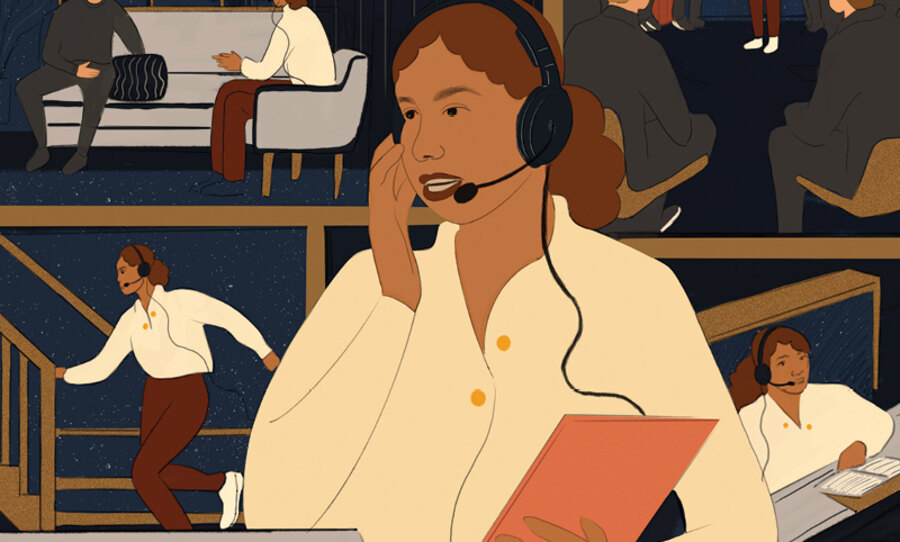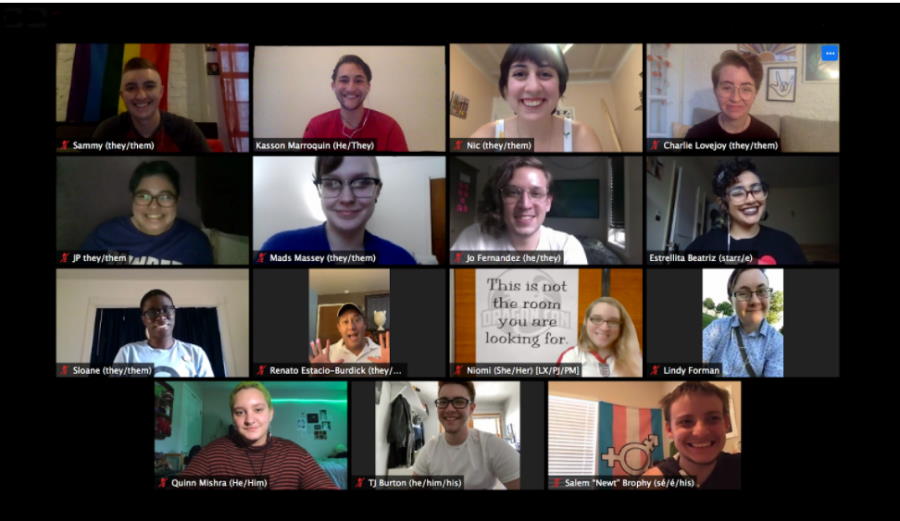People often say that stage management is like pornography—you know it when you see it. In my abstract role as a stage manager, I see people at their best, their worst, their most vulnerable, and their angriest. I’ve been a partner to co-workers in situations I’ve never even witnessed with my own spouse. I spend a lot of time behind closed doors. I could build an empire out of sentences that start with “between you and me.”
Stage managers are sitting in the busy intersection of everything imagined and all of the reality that comes along with it.
My central position in theatremaking does not make me an expert on everything. If I were to give a speech on dynamic ticket pricing or structural engineering, it would be a comedy show. But as a stage manager, I have learned a little about a lot of things. I have access to most everyone, I interact directly with every department in a production. From my vantage point, I would say that theatre has a cohesion problem.
I’ve heard crew members complain about producers scheduling performances on weekends. I’ve witnessed company managers scoff at dancers requesting physical therapy. I’ve had actors try to excuse me from Equity meetings, assuming I’m one of the employers. (Oh, those wild Equity hills. So many die on them, and usually over mountains of ignorance. Actors, employers, directors, and stage managers too.)
I’m not saying each show has its own cohesion problems—I’m saying the entire industry does, and it’s rooted in a lack of education about what our collaborators are experiencing, what the expectations of their jobs actually are, and how we pay for everything. Over the past five years, theatre workers have fought for social justice at all levels of production and sought a deeper understanding of what individuals encounter in the workplace. For many, the passion behind these efforts has been brilliant—like the roar of a jet engine with unlimited potential. We’ve invested our time in reading books on inclusion, attending Zoom workshops on conflict resolution, writing community agreements on giant Post-its, launching programs to dismantle barriers, and starting rehearsals with sharing access needs. Over lunches and coffees, we’ve casually compared successful and rewarding methods for building a healthier working culture. When my civilian husband overhears my meetings, he is in awe of the care we bring to our business. These recent efforts were long overdue and in no way complete; we will never truly see progress unless we also develop a shared understanding of how the theatre economy functions and what people are doing inside of it.
I like to imagine the theatre industry as a turducken—a chicken stuffed inside a duck, stuffed inside a turkey. I’ve never actually eaten one (a piecaken is more my speed), but I like the carnage the image suggests. Generative artists—playwrights, actors, designers, directors, composers, craftspeople, crew—are at the heart of what we do. They’re the chicken—the soul of the operation. But everything we do in professional theatre, whether commercial or nonprofit, is wrapped in business—the turkey that surrounds it all: producers, grantwriters, marketing professionals, development managers, box office managers. Without them, we’re hobbyists.
Middle managers, including stage managers, are the duck in the middle. Without us, you’ve got two barnyard birds creating friction while they try to reason with one another. We’re perfectly positioned to be agents of workplace education around a myriad of issues; communication and facilitation are at the core of what we do. We touch everything—and everything we do can be infused with the generosity of acquiring and sharing knowledge. We should choose to be encyclopedic, insatiably curious, and spread that knowledge around like a gravy.
It is not a stage manager’s job to have all the answers, but we could foster a culture of learning and make it a vital part of the production process.
Many stage managers are already infusing more humane practices into the scaffolding of a production’s working culture. It’s crucial that everyone continue learning how the lack of knowledge about people’s experiences in our industry contributes to harm—especially for marginalized communities. I am suggesting stage managers put the Magic School Bus into overdrive and take deliberate actions to clarify expectations of positions and to encourage understanding about how the business end functions. By seeking this information ourselves, and sharing the knowledge with others, we are creating cohesion that helps us all fly as a flock.
When it comes to understanding the realities of various jobs in the theatre industry, stage managers can do simple things like follow other professionals on social media—the feeds of designers Clint Ramos and Lindsay Jones, for example, offer a free education. We can ask our friends and colleagues to share the expectations they have of themselves in their own jobs, and the expectations they have of their collaborators. When it comes to understanding the business, stage managers can take it upon themselves to learn about budgeting and operations with programs such as Business of Broadway. On our own shows, we can advocate for business managers to explain how budgeting works. Some employers are already teaching their companies about the financial side of theatre and thus empowering the whole endeavor with information about prioritization and economic strategy. It’s much more fruitful to disagree about how money is spent when everyone understands why it’s being spent.
This effort from stage managers won’t work in a vacuum; the chicken and turkey have to be on board too. I’m asking stage managers to serve our industry as vessels of knowledge and vehicles of learning, to be the resident “dramaturgs” of process and understanding. It makes sense that the duck should be the one to do this—we’re uniquely positioned for the job. This effort should be met with friendly corrections, additions, and the sharing of lived experiences, not with shots at the messenger.
It is not a stage manager’s job to have all the answers, but we could foster a culture of learning and make it a vital part of the production process. Stage managers already carry a heavy load, but we must recognize that change isn’t a passive force—it won’t simply arrive and carry us to a better future. Our productivity is fueled by our passion. In deepening our understanding of the laborers and the industry itself, we can use that energy to actively elevate our field. Knowing how the industry functions is essential not only to preserve what’s good but to identify what needs to be dismantled.
I’m calling on stage managers to extend our skills beyond the rehearsal room and “stage manage” a broader campaign for a more cohesive, sustainable operation. By holding ourselves to a higher standard of understanding, we can better advocate for pay equity, improved working conditions, and inclusivity—goals that will remain out of reach unless we first understand the business and behaviors we seek to transform.
The theatre business is dizzying in its imperfections, but we clearly believe in its potential. Otherwise, what are we still doing here? Can you imagine a process where contributors truly understand how to be empathetic, collaborative, and productive all at the same time? I can. If you’re a stage manager and you don’t think this is our work, I ask, who is better situated to drive? I don’t understand how you can sit in the middle of it all and ignore the opportunity to support a better existence for theatre laborers. This is where you should pour your love. It is not about us going above and beyond for a job, it is about us going above and beyond for our industry, for our future, and for each other.
Amanda Spooner is an Equity stage manager and educator based in New York who has worked on and Off-Broadway, regionally, on tour, on events, and in television. She is the founder of Year of the Stage Manager, a grassroots campaign meant to increase visibility for stage managers. Amanda is a faculty member at Ithaca College, where she teaches stage management and production courses.
Support American Theatre: a just and thriving theatre ecology begins with information for all. Please join us in this mission by joining TCG, which entitles you to copies of our quarterly print magazine and helps support a long legacy of quality nonprofit arts journalism.





